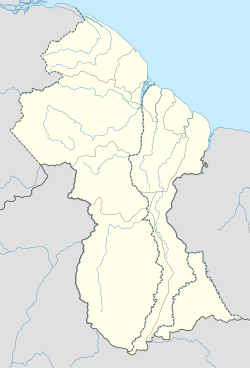Kasuela
Kasuela
Cashew Island | |
|---|---|
village | |
| Coordinates: 3°16′39″N 57°35′58″W / 3.27750°N 57.59944°W / 3.27750; -57.59944 | |
| Country | |
| Region | East Berbice-Corentyne |
| Government | |
| • Toshao | Kenke Jaimo[1] |
| Population (2014)[2] | |
| • Total | 80 |
| Time zone | UTC-4 |
| Climate | Af |
Kasuela (also Cashew Island, Kasjoe Eiland and Casuela) is an indigenous village of the Tiriyó people[3] in the East Berbice-Corentyne region of Guyana. The village has a population of about 80 people.[2] The inhabitants are of the subgroup Mawayana or the Frog people.[4]
The village is located inside the disputed Tigri Area.
History
Kasuela is the oldest village of Western Trio Group and is located on an island in the middle of the New River.[3] Camp Jaguar known in Suriname as Camp Tigri[5] is located about four kilometres (2+1⁄2 miles) north of the village.[2] The first settlers were Tiriyó from Kwamalasamutu in Suriname. In 1997, a Wai-wai family from Akotopono joined the village.[3]
Overview
In 2011, a school was opened in the village.[2] In 2020, the village received access to health care.[6] As of 2018, Kasuela was not connected to the telephone network or internet.[7] The inhabitants are allowed to vote in both the Surinamese elections,[8] as well as the Guyanese elections,[9] however the village did not participate in the 2018 village council elections, because they preferred to choose their leaders in the traditional way.[10]
Kasuela can be accessed via the river or by the airstrip located at Camp Jaguar.[5]
Language
The Mawayana subgroup originally spoke the Mawayana language which has already been replaced by the Tiriyó language.[11] The last two speakers are in Kwamalasamutu as of 2015.[12][11] The transition to Tiriyó was voluntary and a result of banding together in larger villages.[13] The school has already stated that it will teach the children in the English language.[2]
Notes
- ^ "Dorpen en Dorpsbesturen". Vereniging van inheemse dorpshoofden Suriname (in Dutch). Retrieved 15 June 2020.
- ^ a b c d e "GDF impacts Cashew Island through education". Guyana Chronicle. Retrieved 15 June 2020.
- ^ a b c "Amotopoan trails : a recent archaeology of Trio movements - Page 5". University of Leiden. Retrieved 15 June 2020.
- ^ Mans 2011, p. 209-210.
- ^ a b "Een halve eeuw Tigri". Star Nieuws (in Dutch). 19 August 2019. Retrieved 15 June 2020.
- ^ "Newly credited CHW to serve Cashew Island community". Department of Public Information, Guyana. Retrieved 15 June 2020.
- ^ "Telesur wil mast opzetten in Coeroeni en overige nabije dorpen". GFC Nieuws (in Dutch). Retrieved 15 June 2020.
- ^ "Twee stembureaus erbij in kiesressort Coeroeni". De Boodschap.today (in Dutch). Retrieved 15 June 2020.
- ^ "GECOM reports smooth election process thus far". Department of Public Information, Guyana. Retrieved 15 June 2020.
- ^ "Evidence of Political Interference in Village Councils Elections". Kaieteur News Online. Retrieved 21 August 2020.
- ^ a b Mans & Carlin 2015, p. 98.
- ^ Carlin 2006, p. 317.
- ^ Eithne Carlin. "Komende eeuw verdwijnen 6000 van de 7000 talen". Scientias (in Dutch). Retrieved 16 June 2020.
References
- Carlin, Eithne B. (2006). Feeling the Need (PDF). University of Leiden.
- Mans, Jimmy (2011). Hofman, Corinne Lisette; Van Duijvenbode, Anne (eds.). Chapter: Trio movements and the Amotopoan flux. Leiden: Sidestone Press. ISBN 978-90-88-90063-1.
- Mans, Jimmy; Carlin, Eithne B. (2015). Movement through Time in the Southern Guianas: Deconstructing the Amerindian Kaleidoscope. Leiden: Brill.
External links
- The Last of the Mawayana by Unravel magazine
